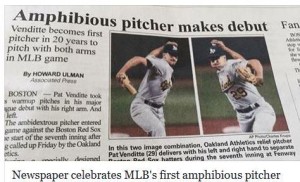 “Texas has a lot of electrical votes.” –Yogi Berra
“Texas has a lot of electrical votes.” –Yogi Berra
A malapropism (or acyrologia) is the use of an incorrect but similar-sounding word in place of the correct word. It was coined from the name of a character, Mrs. Malaprop, who constantly misused and abused her words in the comedy The Rivals by Richard Brinsley Sheridan. In turn, Mrs. Malaprop’s name ultimately descended from the French phrase mal à propos meaning badly placed or inappropriate.
There are two reasons writers (and others) may get their words mixed up. The first, of course, is the similarity of sound. In the quote above, Yogi Berra was actually referring to electoral votes, but electrical is pretty close. Close, but no cigar.
The second reason is that very often words get modified in common usage, especially old words whose original meanings no longer have a relevance for us today, yet the word has evolved into a new usage and often a new spelling. An example of this is tenterhooks.
Many people say (or write), “I’m on tenderhooks,” believing the word refers to the hooks used by butchers to hang meat so it can tenderize. Actually the word goes back much further than that, back to the middle ages when people used mainly woolen or linen cloth. As the cloth was processed and washed, it was stretched on wooden frames, called tenters, to keep it from shrinking as it dried. The hooks on the tenters that were used to hold the cloth in place were, of course, tenterhooks. The colloquial meaning came to allude to the tension of being forcefully tacked and stretched, and has now evolved to mean any kind of suspenseful tension.
Any word, however, can be accidentally twisted into an inappropriate usage. Some examples of malapropisms might include:
After a detailed investigation, the police comprehended two suspects.
I do believe that man is having a nervous shakedown.
King Omar is the exhausted ruler of his rich kingdom.
If you’re smart, you won’t upset the apple tart.
We had great fun riding together on a tantrum bicycle.
Many people have benefited from joining Alcoholics Unanimous.
 There is one place where malapropisms can be used and are not only appropriate but can add to a story, as well: comic relief. Mrs. Malaprop herself added this funny, if painful, dimension to the original story. Shakespeare has used similar characters in several of his plays. In my own satire of romance novels, The Pits of Passion, I have one very naïve character who constantly misspeaks, and the results can be quite comical. As with any tool, writers need to know the rules before they break them, but every tool has its exceptions.
There is one place where malapropisms can be used and are not only appropriate but can add to a story, as well: comic relief. Mrs. Malaprop herself added this funny, if painful, dimension to the original story. Shakespeare has used similar characters in several of his plays. In my own satire of romance novels, The Pits of Passion, I have one very naïve character who constantly misspeaks, and the results can be quite comical. As with any tool, writers need to know the rules before they break them, but every tool has its exceptions.
So now let’s lay a reef on the grave of accidental malapropisms and make sure we’re using the correct words. Not sure you completely understand the meaning and spelling of a word? Look it up! No matter how many books we’ve written, we’re never too old to learn!

Great article. For me, malapropisms are usually caused by spell-check on auto-correct. Other times it’s plain-old writer error – like when a soldier earns a metal of honor, instead of a medal of honor.
Great example, Bruce. It’s often tricking our internal ear; it sounds right. Just not right enough.
Btw, my thanks to KS Brooks for finding that actual newspaper headline above. Hard to believe that got by the editors.
Who could resist that one? You’re very welcome, m’dear.
And I thought the pitcher was being ambidextral!
One I often hear as well as read is “exasperate” instead of “exacerbate.” It always makes me grin!
Another good one, Linda.
If I saw tenterhooks, I’d think it was an error. (Guess I’m not as smart as I thought I was.) 🙂
I think it’s just that you’re not as OLD as you thought you were! It’s pretty archaic, yet the wrong word and usage stays with us.
The malapropism is rather a two-edged sword, if you use it on purpose, as Yogi Berra did. The stupid people will miss it completely. The people who think they’re smart will think you’re stupid. Only the really smart people will realize how smart you are!
True that, Gordon. As with any satire, it can be subtle enough to fly over the heads of the unsuspecting.
Or if it’s used in dialogue to indicate a character getting it wrong, which is sometimes fun and a way to define the way a character speaks. Odds are, though, a reader will just think YOU’RE wrong.
Thanks. Educative to be intercoursed to malapropisms.
I think you’ve got the hang of it!
These quirks of speech are more common that one realises. Listening to some live radio broadcasts from around the UK recently, where were local people discusted their everyday lives, I noticed that about one in five speakers used wrong words, completely naturably and with no intent to be funny. It was enough to make me go back and listen to the replay.
And of course TV and radio journalists are trained to completely ignore a miffed word and just keep on talking, so many of them slip by without notice. Catching them definitely adds a new humorous dimension to the news!
If you are relentlessly precise about your language as you write, you can position acyrologia and parapraxis in dialog to add color to a character and even to create a sense of a local dialect. If you make the same kind of “mistakes” yourself elsewhere in the text, however, the effect will be lost, and worse, the reader will think you just don’t know better. Even when your language is precise if you overdo such intentional usage, you risk the comedic effect Melissa wrote about.
On a separate note, the verb “to flounder” is thought by some to have started out from “to founder”. Perhaps it is a distant acyrologia that became standard usage, the fish image too powerful to not win the usage battle?
Michele, I hadn’t thought about the flounder/founder relationship, but it’s very possible. Or could just be a fluke!
My family would tell you I’ve had the hank of it four a long time. I regularly get my worms mixed up when trying to explode complicating things. I find it creeps into my scripture because I rite as I would tell the story aloud. Then it takes a lot of time editing out the madopropisms and spelling mistooks. 🙂
Ian, why do I think I’ve created a monster here?
Could it be that ‘to flounder’ is supposed to indicate flapping about like a stranded flatfish whilst fishing for the right word, idea, or action?
Do you really think it’s a monastery? Pray that it’s not!
I don’t know how many times in the past that I have heard people say they had “ammonia” instead of “pneumonia”. Maybe if you sniffed ammonia you would get pneumonia? I noticed in a movie I have that someone says “renumeration” instead of “remuneration”. The subtitle had it right, but the actor didn’t.
Amazing sometimes what slips by.
Thank you for the edumacation, Melissa. My latest favorite: nip it in the butt. Unless that’s the character’s intention.
LOL, Laurie!
Wouldn’t that depend on whether it was a bottom worth pinching? 🙂